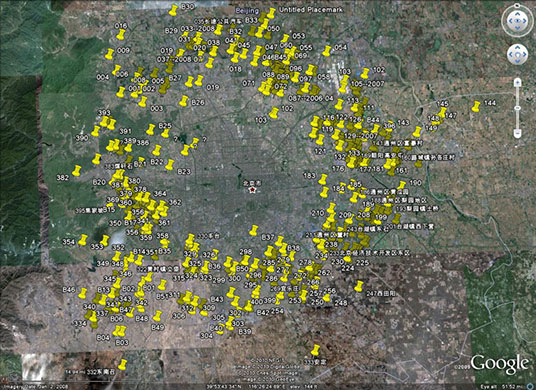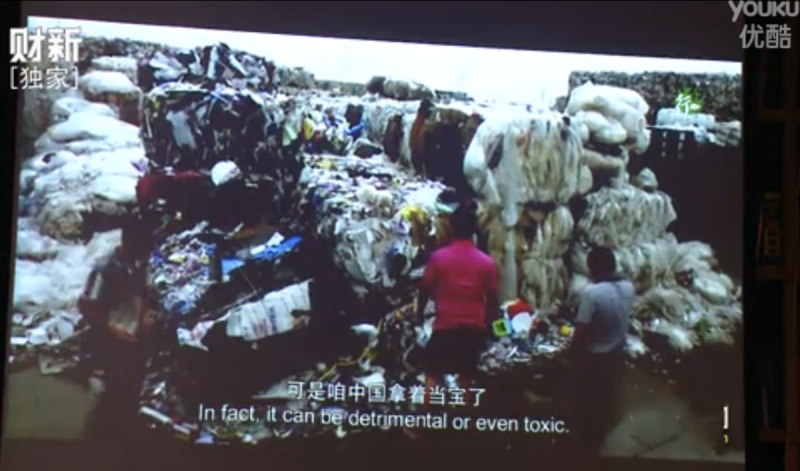China’s pursuit of high growth at any cost in the past decades has led to serious environmental pollution that the government can’t cover up and the public can’t ignore. Adding to the problem of the smog are garbage and plastic waste.
“Plastic Kingdom“, a documentary outlining how imported plastic waste pollute many parts of the country, has shocked many and sparked discussion after it was broadcast and reported on in various media outlets.
Independent filmmaker Wang Jiuliang spent three years on the film, visiting plastic recycling centers around China to unveil the darker side of the industry, which isn't well known among the public.
The film shows how the sorting process of plastic waste is harmful to those workers involved. Besides the bad smell, much of the waste contains dangerous materials with poisonous or corrosive elements, to which the workers could easily be exposed. The use of water in the recycling process also causes serious local pollution. In many cases, waste water is discharged into rivers without any treatment, making both surface water and groundwater unusable and harmful. Burning plastic waste produces large amounts of exhaust and heavily pollutes the air, while in many locations with plastic recycling centers cancer is common.
China is the world’s largest recycler and imports about 70 percent of the recyclable plastics and e-waste on the global market.
Asides from imported plastic waste, China also produces a huge amount of trash. In fact, Wang gained fame three years ago for “Beijing Besieged by Waste“, another documentary about waste disposal and pollution around the capital.
With a population of about 20 million, the growing city of Beijing produces 30,000 tons of waste each day. Wang traveled around the city and visited 460 legal and illegal landfills from 2008 to 2010 to document the collection of garbage and excrement, the environmental calamity and the people who survive off of these landfills, including scavengers building a precarious livelihood, green spaces forming on top of waste, and livestock being fed trash. The documentary offered an informative and alarming portrait of urban ecology.
The project started with Wang wondering where Beijing's massive amounts of waste ended up. He used Google Earth to plot hundreds of landfill sites over three years, creating a map of dots that formed a huge circle around the capital.

Wang Jiuliang's map on rubbish sites around Beijing city.
The film aroused widespread public concerns and was credited with having prodded the Beijing municipal government into allocating 10 billion RMB ($1.65 billion) to cleaning up waste.
While the Chinese authorities have long been indifferent to the environment as it pursued economic development, combating pollution has become a greater concern among the public as they've learned more about foul air, contaminated produce and polluted water. According to United Nations data from 2013, about 70% of the 20 million to 50 million tons of electronic waste produced globally each year is dumped in China, with most of the rest going to India and African nations. China appears to be the largest e-waste dumping site in the world.
For the past decade, the southeastern town of Guiyu, nestled in China's main manufacturing zone, has been a major hub for the disposal of e-waste. Hundreds of thousands of people here have toiled dismantling the world's electronic junk.
“The numerous economic achievements China has made in the last 30 years are worthless and cheap in comparison to the cost to the environment and people's living standards,” said Wang when he was interviewed by AP last December.
People have expressed their shock and anger on China’s Twitter-like Weibo after watching reports about “Plastics Kingdom” on state television.
A journalism professor Yang Boxu with Peking University slammed the waste recycling industry as “letting Chinese die without descendants”. Weibo user “Living at a temple in mountain” (@兰若山居) exclaimed:
怪不得权贵们都忙着移民,大好河山成垃圾场了。可怜了悲催如我等草民。
No wonder the rich and powerful have been busy emigrating. China has become a big garbage site. And we as grassroots have to remain miserable [live with the garbage site]
Lawyer Xu Zhibiao commented with sarcasm:
因为他们已投奔美帝或者已准备好投奔美帝,这里已不是他们的家。
Because they have immigrated or are ready to immigrate to America. China no longer has their homeland.
“Sisyphus pushing the stone uphill” highlighted a scene from “Plastic Kingdom”:
节目里,《塑料王国》的导演王久良问工人——“王久良:那你这么辛苦赚钱是为了什么?分拣工人:为了孩子,为爸爸妈妈。”接着的镜头是他垃圾堆里目光呆滞脏兮兮的孩子,人是多么矛盾,或者说无知,或者无奈,人为什么可以活得卑微到这种程度。
Asked by the filmmaker why he's struggled to make money by working on waste, the sorting worker said he’s done this for his kid and parents. Then the lens turned to his kid in a waste pile appearing dirty and dull-looking. How could a person become so ignorant and helpless! How can a person live so inferior!
Tecent news portal featured “Plastic Kingdom” on its public goods special section and attracted more than a thousand comments. “Cappuccino” moaned:
看完后很心疼,如此恶劣的环境下工作自己的家庭孩子生活在这样的环境下成长,有关部门的监管去哪里了?那昧著良心的广场老板难道就不知道这个违法以及在破坏自己的家乡吗?畜生
So grieved after seeing this. In such a terrible environment the workers deal with waste and their children grow up. Where are the regulations? Doesn’t the boss know this violates laws and ruins his hometown? Bastard.
“Tolerance” believed the industry survives on contemporary Chinese money philosophy:
中国人赚钱哲学是:钱财不问来路,笑贫不笑娼。
Chinese philosophy of making money: people aren’t concerned how you make money; poverty instead of prostitution is laughed at.
“Summer” exclaimed:
我恶心我越看新闻越火大我怀疑中国在这么下去不用美国和日本来我们国家在过几年十几年基本因为环境问题都死绝了
I’m disgusted and enraged seeing this. I’m wondering whether the Chinese will die out after decades due to the worsening environment, without the Americans and Japanese beating us.
Chinese netizens also commented on the recycling industry and deteriorating environment on another news portal, NetEase.
“shuangziyijia” believed the problem is one of corruption:
为了钱什么都能出卖……反正他们的子女都去国外了……
没有监督的绝对权力是人类史上的最大毒瘤……
The authorities would sell everything for money……their children have immigrated abroad……The absolute power without supervision is the biggest cancer in human history








1 comment
https://www.youtube.com/watch?v=ojEg5AAwIQg&list=UUuxXZA3b0MIPnig4qIy7FVA&index=5